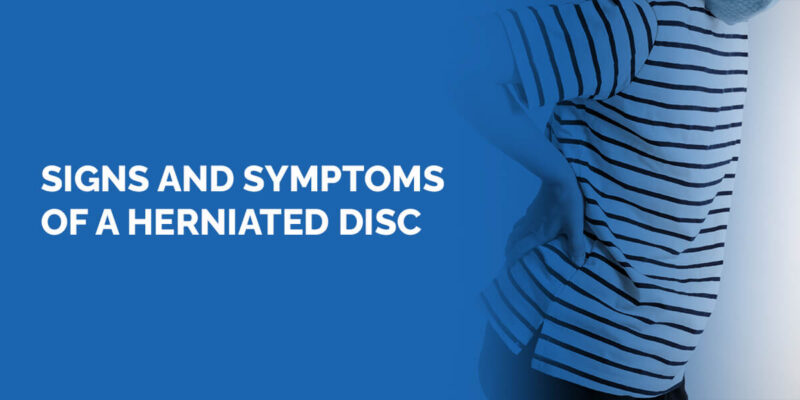

While the spine is a resilient part of the body, it experiences wear and tear throughout a person’s life. Unfortunately, this strain and pressure may lead to various spinal conditions, including a herniated disc.
The spine is a complex collection of bones, cartilage and nerves. Three natural curves create an S shape, which helps absorb shock and protect it from injury. The spine also comprises 33 vertebrae, intervertebral discs, facet joints, spinal nerves and soft tissues, allowing the body to stand upright and move freely.
A herniated disc is damage or an injury to the spinal column. Round cushions between each vertebra are known as spinal discs, which serve as a buffer and prevent the vertebrae from grinding against one another when you move. A herniated disc happens when one of these discs experiences a tear, damage or leak. For this reason, other names for a herniated disc include bulging disc, protruding disc, slipped disc, pinched nerve or ruptured disc.
These terms indicate damage or injury to the spinal disc, causing back or neck pain. A herniated disc can cause two types of pain — disc-related pain or a pinched nerve. The spinal disc itself may be causing discomfort or pain if it causes spinal instability, known as degenerative disc disease.
Degenerative disc pain often causes low-level, constant pain around the disc with occasional episodes of severe pain. A herniated disc in the lower back may also cause pain from a pinched nerve. In cases of a pinched nerve, the disc itself is not painful, but it may be compressing a nearby spinal nerve.
A damaged spinal disc may leak fluid, causing nearby nerves to inflame or become irritated, which results in radicular pain or nerve root pain. Radicular pain often causes shooting, sharp pain that can radiate throughout the body, including down the legs and arms.
While a herniated disc can develop within any spinal disc, they are most common within the lower back, as the lower spine often experiences more wear, tear and stress. Ninety-five percent of patients with a herniated disc between 25 to 55 years old experience disc-related complications of the lower lumbar spine.
Herniated disc symptoms vary depending on the severity and where the injured disc is located. It is also possible to have a herniated disc with no pain because not all herniated discs cause noticeable symptoms. Some of the most common herniated disc symptoms include:
Research finds approximately five to 20 individuals per 1000 adults experience a herniated disc, most commonly in the 30 to 50 age group.
There are two main causes of a herniated disc — age and trauma. Age is a leading factor in disc herniation. With age, the spinal discs begin to gradually lose fluid, a condition known as degenerative disc disease. Wear and tear on the spinal discs cause tears and cracks on the disc’s outer layer, where the interior fluid may leak from.
Trauma is another common cause of disc herniation. When the spinal disc is damaged, torn or overstressed, it can rupture because of high-impact trauma, such as a fall, collision or car accident. For example, a herniated neck disc may develop following a sports injury. Risk factors that may increase a person’s risk of developing a herniated disc include:
A spinal specialist may recommend several tests to diagnose a herniated disc properly. Two of the most common herniated disc diagnosis tests include:
Once you have confirmed your symptoms are due to a herniated disc, you have a couple of options — seeking treatment or waiting for it to heal itself. A herniated disc can get better on its own, although it can take some time.
To allow it time to heal itself, you will need to follow these instructions:
Choosing treatment with a herniated disc doctor can allow for a quicker and more controlled recovery. After our physicians at New York Spine Institute (NYSI) diagnose a herniated disc, they will discuss potential treatment options with you to improve your herniated disc symptoms, minimizing the risk of the herniated disc worsening or causing severe symptoms in the future.
Some of our most common and effective herniated disc treatments include:
The New York Spine Institute (NYSI) is a trusted source for accurate, timely diagnoses for various spinal conditions. Our team of experts understands orthopedic and spinal conditions can negatively impact daily life, and they work hard to help each patient regain mobility and return to leading a pain-free life.
Our physicians are proud to offer innovative spinal services, including neurosurgery, pain management and diagnostics. We also provide scoliosis treatments, orthopedic care and more.
Request an appointment online to learn more about herniated disc treatments and other spinal conditions.